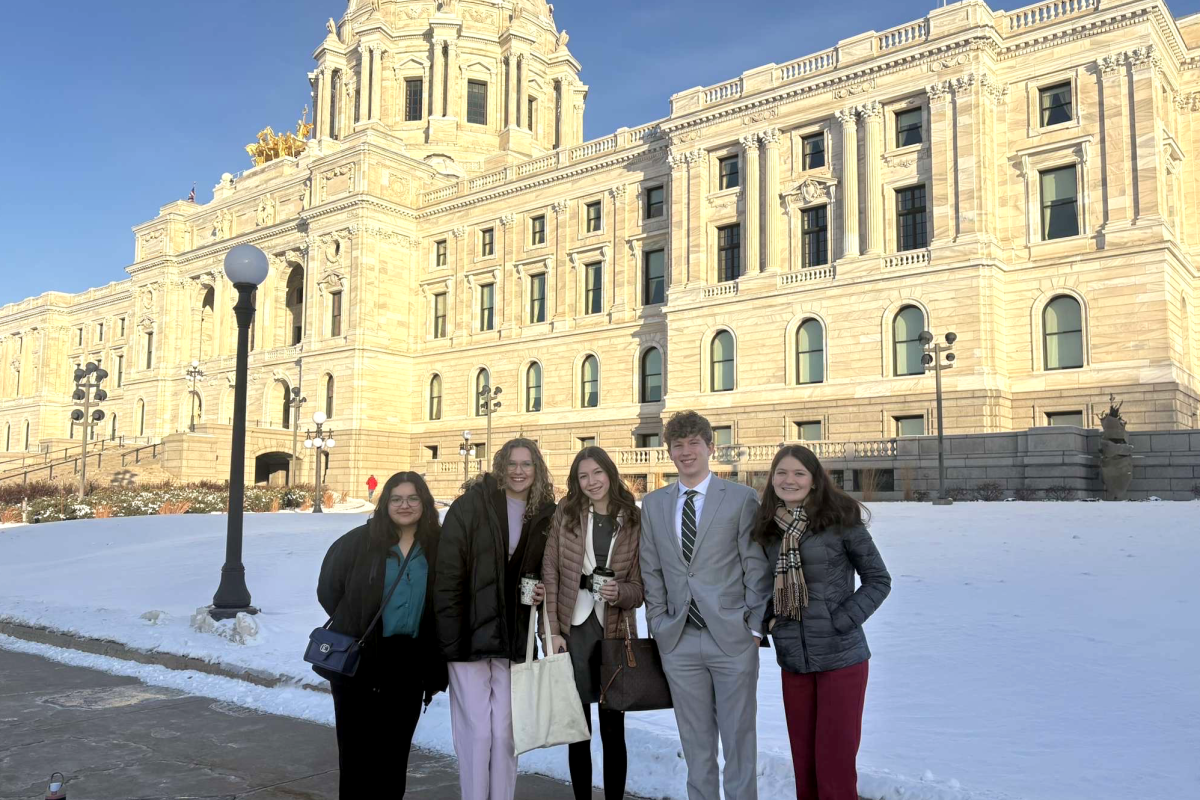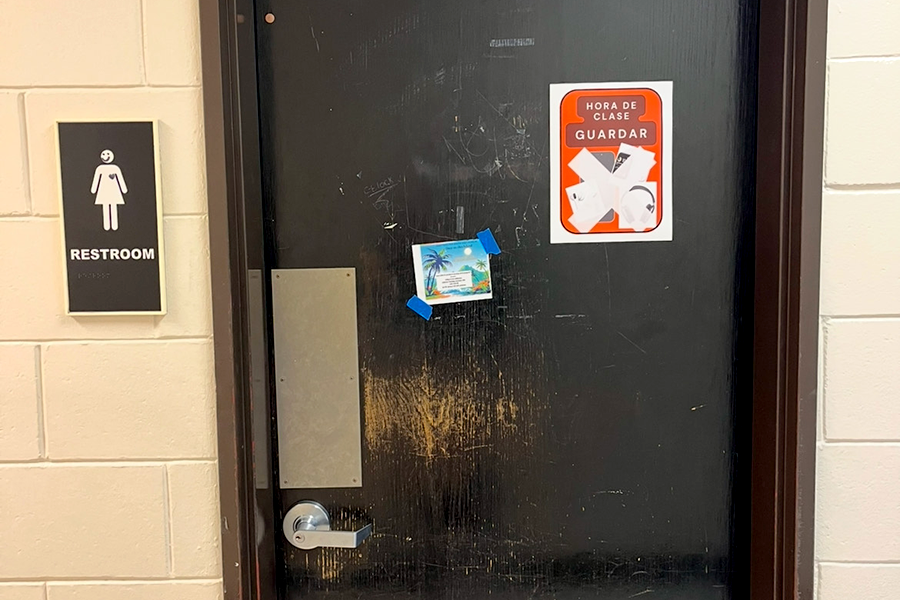In mid February, classrooms at South were invaded by people dressed all in black, taking books that students were reading out of their hands, and covering up posters that needed to be removed. When the confused students wondered what was going on, the answer they got was simple: ethnic studies had been banned, and anything promoting ethnicity had to go.
Thankfully, here at South the officials dressed in black were really students from the Human Rights Group and Unidos. But what they were pantomiming is something very real happening in the state of Arizona.
Nearly two years ago, a law was passed in Arizona banning ethnic studies. “Last year we did an auditorium about this,” said senior Elena Anderson, president of the Human Rights Group, “but we didn’t even know the extent to which it would go, with getting rid of books and posters and stuff like that.”
House Bill 2281 was put into effect at the beginning of last month. It is a law that bans programs that cater to students of a certain ethnicity, such as the All Nations program at South.
The Hispanic Studies department of the Tucson Unified School District was created in 1997. The classes focus on critical thinking and on using history and culture to help define an individual’s identity. Studies have shown that these classes have improved student’s scores on Arizona standardized tests.
Arizona has a very high number of Mexican American students who end up dropping out of school, with a rate of 3.4% in the 2009-10 school year. The classes in the Hispanic Studies Department have helped to get students, especially those of Hispanic descent, more interested in school.
“The kids who were involved in [drugs and violence] actually paid attention in school, because they were learning about their culture and what they like, and so they were interested. But when this was taken down, they were disappointed and they felt like their culture wasn’t valued,” said junior Vilma Quito, a member of Unidos and participant in the protests at South.
“If I was in their situation, I would feel really bad and I’d feel like that would actually lead me to not like America and feel like they’re going against me!” said Quito.
Though the law issues a blanket ban on all ethnic studies, it is specifically aimed at Mexican American studies. Ironically, it was a Mexican immigrant, Estevan Ochua, who founded the first public school in Tucson. Native American studies are not affected, but only because they are protected by law.
“I feel singled out,” said senior Jonothan Moreno, president of Unidos. “They said all ethnic studies, but basically they’re saying it’s for Mexican Americans. I’m not Mexican American, but I have a lot of Mexican American friends, and we’re all Hispanic.”
This law has triggered shock and disbelief from most of the country. However, with Arizona’s track record, Moreno was not surprised.
“They already have a bill passed for [immigrants], that they have to check for your ID to see if you’re an immigrant or not, so coming from Arizona, it wasn’t something that was that big of a shock for me.”
“I think they’re doing this because they think it’s a threat.” said Quito, of the government of Arizona’s motives. “They think that what [the programs are] trying to do is make America look bad. So they’re afraid that the kids will grow up thinking that America is bad for them, and then probably revolt or something.”
Anderson said, “There’s a lot of people who are very against the amount of immigration that’s happening in Arizona…and that’s why a lot of the programs being targeted are Hispanic studies.”
To Rob Panning-Miller, social studies teacher at South, it was obvious from the beginning that South would have to respond to Arizona’s cry for support.
“It was just shocking. It’s just amazing that people are this close-minded in this day,” said Panning-Miller.
“In order to get other actions carried out, in order to really improve the situation for people, and human rights for people, you have to make sure they have access to information, and depriving them of information is violating essential human rights.”
Beyond just taking away students’ rights to learn about their heritage, this law is also “blatantly trying to rewrite history,” as Anderson said. It will effectively force schools and teachers to skip over huge parts of history. This will result in a huge gap of knowledge in the Tucson Unified School District.
Anneliese Lee-Reid, a sophomore whose APUSH class was one in which the students demonstrated, said, “Our country is a country of immigrants! We can’t just not learn about where we all come from.”
In its enforcement of the bill, the Tuscon school district removed a long list of books from the classroom, including “The House on Mango Street” by Sandra Cisneros, Shakespeare’s “The Tempest,” “A People’s History of the United States” by Howard Zinn, and “Ten Little Indians” by Sherman Alexie. The official story with these books is that they “have been moved to the district storage facility,” according to the Tucson Unified School District. While the government insists that students still have access to the material, the fact remains that these books have been taken out of the curriculum, and people are being actively discouraged from reading them.
“They’re telling people, especially students, young people, that they should be ashamed of their culture,” said Anderson. “Making something illegal makes it shameful, and making ethnicity illegal or certain type of history illegal gives an amount of shame to be associated with a culture.”
Because the teachers of Tucson cannot teach these books any longer, they appealed to teachers around the country to take time during the month of February to teach what they can’t, and to use these books in their own curriculum.
When Panning-Miller heard about this, he immediately brought it up to Human Rights Group and Unidos, both of which responded with enthusiasm.
“I’m actually really proud to participate in this, because it make me feel like I’m actually doing something, and that I’m standing up for something, especially if it affects my culture,” said Quito. “I’m not Mexican, but it still affects me, because I’m still not American.”
The protest at South took place in three parts. The first part was set up to mimic what government officials did in Arizona, going into classrooms and taking down anything that could be associated with ethnic studies.
“We want [students] to be confused,” said Moreno. “That that will hopefully get the idea into their heads.”
When the Unidos and Human Rights Group students entered the classroom, Lee-Reid was initially “really worried. At first I thought it was a joke, and then when they explained what was going on I got really afraid-I thought that this was actually going on in Minnesota.”
In many classes, Moreno addressed the students.
“From now on you guys can’t learn anything about ethnic studies,” he said to rooms full of confused students. “If there’s a poem you really like by a Mexican author, or maybe your favorite book was written by a Native American author, you can’t read them anymore. Just white people history from now on. How does that make you feel?”
Quito said of South students’ first reactions to the protests: “They’re going to be shocked, or they’re going to be wondering what’s happening,” and that was certainly the response that dominated the classrooms. Many students were asking “why?,” and understanding what the bill meant did not relieve the confusion. “It’s really stupid,” said Lee-Reid.
When leaving the Laura Wagner’s 5th hour APUSH class, Moreno said: “Do you know why this is happening? Because learning ethnic studies is going to make you want to overthrow the government. Obviously.”
Though this may sound merely satirical or even funny coming from the mouth of a high schooler, House Bill 2281 does express the fear that classes that focus on a particular culture or ethnicity promote the overthrowing of the US government. The proponents of the bill have also said that these classes engage in hate speech, sedition, racism, and instill revolutionary values in their students.
The majority of the proponents of the bill are, unsurprisingly, white. They have been advocating for the shutting down of the program since 2009, and the State Attorney General Tom Horne, who was the one to first propose the bill, never even visited any of the classrooms, though several invitations were extended to him.
The second part was more about spreading awareness. The Human Rights Group and Unidos hosted a screening of the movie “Precious Knowledge,” a documentary following the Mexican-American studies program at a Tucson high school, from the first proposal of the bill up to now.
One week after the classroom protests, Unidos hosted a read-in in the library. Several students and teachers and volunteers took turns reading all day from books that have been banned in Arizona.
“It was really nice to see everybody get together. There were a lot of classes coming in, so we actually had an audience. We weren’t really expecting to have that.”
South isn’t alone in protesting. Central High School in St. Paul recently protested the book ban. Nationally, an organization called Save Ethnic Studies, which Panning-Miller belongs to, has been founded just to counter the injustices in Arizona.
“They’re doing what a lot of other groups are doing, which is trying to support the efforts of teachers and students and parents in Arizona,” said Panning-Miller, “a lot of people-and this is kind of the approach I took also-are looking to get direction from Arizona.”
In March, a movement will take place starting in Houston, Texas and making it’s way down to Tucson. This movement, called the Librotraficante (book trafficking) Caravan, will end with the distribution of banned books in Arizona. This is the work of teachers, authors, and activists who have been outraged by the censorship of material in Arizona. Many members of the group are authors who have had their books banned, such as Sandra Cisneros. Along the route there will be events that spread awareness about the situation.
The students of Arizona have not been silent either. They have been organizing protest since the first proposal of the bill, and continue to do so, despite few reactions from the government. They maintain a position of civil disobedience, and are careful not to get violent or angry about their cause, as this would only prove what government officials have been saying about them all along.
“Extra encouragement helps people carry out their own struggles,” said Panning-Miller, and hopefully this will be the case for Arizona. With an overwhelming show of support from states all across the nation, and with the law only being around a month old, there is still hope for the education system of Arizona.
As for the protests at South, they seem to have been largely successful in accomplishing their goals. “We got a lot of people’s attention, and we saw good reactions,” said Quito. “We did do a little something, you know, we made our voices heard.”







